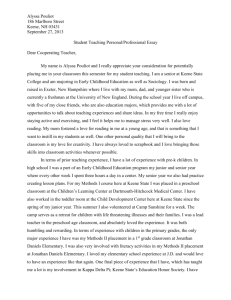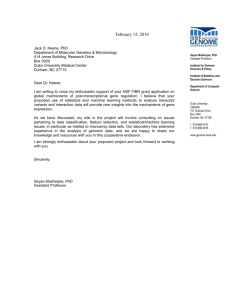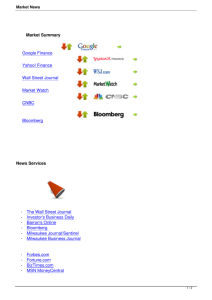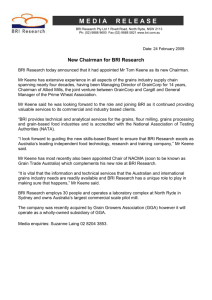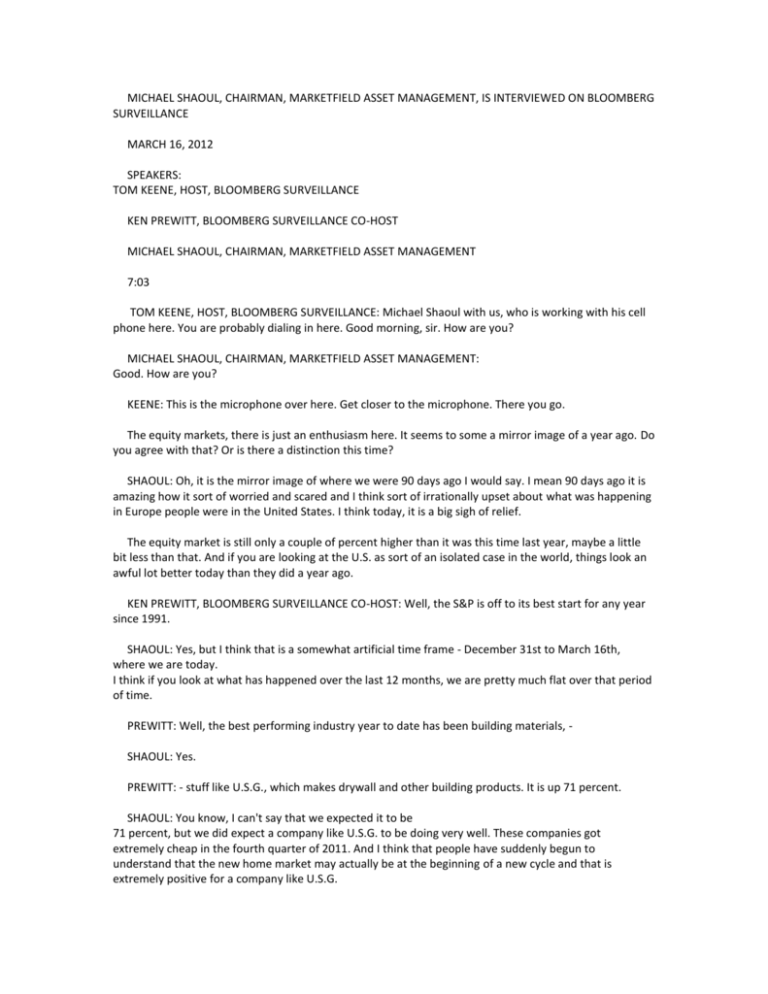
MICHAEL SHAOUL, CHAIRMAN, MARKETFIELD ASSET MANAGEMENT, IS INTERVIEWED ON BLOOMBERG
SURVEILLANCE
MARCH 16, 2012
SPEAKERS:
TOM KEENE, HOST, BLOOMBERG SURVEILLANCE
KEN PREWITT, BLOOMBERG SURVEILLANCE CO-HOST
MICHAEL SHAOUL, CHAIRMAN, MARKETFIELD ASSET MANAGEMENT
7:03
TOM KEENE, HOST, BLOOMBERG SURVEILLANCE: Michael Shaoul with us, who is working with his cell
phone here. You are probably dialing in here. Good morning, sir. How are you?
MICHAEL SHAOUL, CHAIRMAN, MARKETFIELD ASSET MANAGEMENT:
Good. How are you?
KEENE: This is the microphone over here. Get closer to the microphone. There you go.
The equity markets, there is just an enthusiasm here. It seems to some a mirror image of a year ago. Do
you agree with that? Or is there a distinction this time?
SHAOUL: Oh, it is the mirror image of where we were 90 days ago I would say. I mean 90 days ago it is
amazing how it sort of worried and scared and I think sort of irrationally upset about what was happening
in Europe people were in the United States. I think today, it is a big sigh of relief.
The equity market is still only a couple of percent higher than it was this time last year, maybe a little
bit less than that. And if you are looking at the U.S. as sort of an isolated case in the world, things look an
awful lot better today than they did a year ago.
KEN PREWITT, BLOOMBERG SURVEILLANCE CO-HOST: Well, the S&P is off to its best start for any year
since 1991.
SHAOUL: Yes, but I think that is a somewhat artificial time frame - December 31st to March 16th,
where we are today.
I think if you look at what has happened over the last 12 months, we are pretty much flat over that period
of time.
PREWITT: Well, the best performing industry year to date has been building materials, SHAOUL: Yes.
PREWITT: - stuff like U.S.G., which makes drywall and other building products. It is up 71 percent.
SHAOUL: You know, I can't say that we expected it to be
71 percent, but we did expect a company like U.S.G. to be doing very well. These companies got
extremely cheap in the fourth quarter of 2011. And I think that people have suddenly begun to
understand that the new home market may actually be at the beginning of a new cycle and that is
extremely positive for a company like U.S.G.
PREWITT: Yes. Well, how can that be with all the pending foreclosures and all the doom and gloom
around the country?
SHAOUL: Well, I think that the new home market and the existing home market have really diverged in
the crisis. If you look at the existing home market, the activity never really got below where it was in the
mid-1990s, and I think that is going to continue.
The new home market had a real digression. You know, new home sales, new home construction is
back to where it was in the late 1960s. And so it is quite easy for the new home market to really start to
do better at this point in time. In fact, it is extraordinary that we have managed to keep volume as low as
we have for as long as we have. This is remarkable.
KEENE: You work for one of the most sophisticated shops on the Street, Marketfield Asset
Management and Oscar Gruss and the rest of it. To our listeners who are not rocket scientists, how should
they act day to day given the abrupt move we have seen from October? What would be your advice on
deploying or keeping capital at risk that we have moved so far, so fast?
SHAOUL: That is a great question. You know, I think that you have to be a little bit schizophrenic in this
world. I think that in the United States, this is a buy and hold market.
I think the big mistake people have made over the last two or three years is they have responded to
daily volatility by over trading their portfolios. And what that has meant is you have got out in the
downdraft and you failed to get back in and missed the sort of move that Ken was talking about.
KEENE: Okay.
SHAOUL: I think in other parts of the world, particularly the emerging market complex, we really are at
the end of this long, great ten year cycle, and it is really time - that is where you want to be taking capital
off the table.
The same thing with fixed income. You have a remarkable move in fixed income. I was looking at some
of the emerging market bond ETFs and looking at the prices of the bonds within their holdings. But there
are many, many emerging market bonds trading at 130, 140 points at this point in time.
KEENE: Yes.
SHAOUL: And the interest rate risk out there is very significant.
KEENE: Yes. And now, folks, we going to do a public service. I have out on Bloomberg BusinessWeek
EconoChat in a couple of hours an article on market timing. We are going to talk to Michael Shaoul about
this right now.
Every survey I have ever seen on market timing says it doesn't work. I would say it is asymmetric, it
doesn't work.
It is somewhat easy to stay and sustain, but the hardest thing is to know when to get in when the gloom is
high, witness last October.
SHAOUL: Yes.
KEENE: To me, that is the toughest pro skill set of deploying capital when it is gloom out there.
SHAOUL: I think that is true. And what you have to do is you have to decide what is bugging the market
and when fundamentals have suddenly changed.
And the big change if you went back to say last October was that the ECB started expanding its balance
sheet in late August, early September. That was really the signal that this was going to be an opportunity
to pick up things in a liquidation. And you had to be patient with it. You had to expect the market to put
you under great pressure. But if you did it, you were rewarded.
KEENE: And, Ken, this goes to Marty Zweig years ago, don't fight the fed. If the fed is going to be
accommodative, we didn't know that from Trichet to Draghi the ECB would join the party. But there it
was, the elephant in the room if you will.
PREWITT: Well, one other appropriate quote here from Andrew Tobias, a financial writer, "Nobody can
time the market, not you, not me, the man on all news radio."
KEENE: That would be true, Ken Prewitt. Michael, what is the most attractive opportunity right now?
You come in and we had this run. You are cross asset truly. Where is the most attractive opportunity? Is it
weak yen?
SHAOUL: Oh, gosh. I think the yen probably will get weaker. But I - you know, I am going to boring and
say that we like the domestic U.S. economy. I mean we have really been banging this drum for two, three
years at this point in time.
But we still like it. We think it is a real bull market in the U.S., which started just over three years ago. It
might have another year or two to go.
And I have got to be excited about the Nasdaq at a 12 year high, and retail stocks at all time highs at
this point in time. Yes, I think we will have a pull back. I think we will have a scare at some point in 2011,
but I think you will see your way through that - 2012 rather - I think we will see our way through that. And
I think this is where you want to be.
KEENE: Did you book this meeting today just so you could go over to the Apple store and get an iPad 3
on your way home?
SHAOUL: You know, I think Apple is an amazing company.
But we have never owned a share of it, and I have never owned an Apple product.
KEENE: Really?
SHAOUL: I am PREWITT: No kidding?
SHAOUL: I actually have a Nokia phone I am embarrassed to say. And I am a kind of a dinosaur in that
respect.
KEENE: That's a very exclusive. Michael Shaoul, dinosaur, here. John Tucker's cell phone here, folks. It
looks like the one Michael Douglas used. Don't touch it.
JOHN TUCKER, BLOOMBERG NEWS: You might break it. You're in good company.
KEENE: Where's my iPhone? I have got to take a photo of your cell phone.
PREWITT: You come in later than I do, Tom. Were they lined up? Because at 3:30 am, I was surprised.
TUCKER: When I came in at a little after 4:00 o'clock, they were wrapped up - I would say maybe 300
people were out there.
PREWITT: Oh, really? I just saw about half a dozen TV trucks out front.
KEENE: I want to come back and talk to Michael Shaoul about India, about China. The FT with that great
article yesterday on the new leadership in China and some things going on in India as well. We don't
spend enough time there, and we'll talk to him about that.
7:10
(BREAK)
7:19
KEENE: Michael Shaoul with us from Marketfield Asset Management. You wrote a brief note to us on
India. What has your attention on India right now?
SHAOUL: You know, I think in India you have extremely tight monetary conditions brought about by the
RBI. And it is one of these like classic late cycle dilemmas where you have a central bank fighting asset
price inflation in its local real estate market and fighting CPI inflation in India, which is considerable.
And looking at a banking system, which is now super tight. I mean you have a - you know, you have
interest rates of 8.5 percent set by the central bank and the money market is well over 11 percent. You
never like to see the cost of credit to a bank being 250 basis points higher than where the central bank is
setting at.
KEENE: Well, they have inflation, which looks to be successful. And then, you know, it was nine
percent, eight percent, and they have really brought it down with that tightening strategy, haven't they?
SHAOUL: Yes, they have. And my guess is they will bring their inflation down and they will bring their
real estate market down with it. And you will have somewhat of a credit cycle in India. They have
suddenly brought their equity market down as well over the last 18 months.
Again, India has had a very, very strong start to 2012, but it does not disguise the fact that it had an
awful 2011.
And it has really stopped making progress in the last couple of weeks.
KEENE: Yes, I like that. They have stopped making progress. What is the greatest distinction investing in investing between India and China?
SHAOUL: You know, first of all, they have really been out of phase. The Chinese equity market peaked
in 2007 and the Indian market peaked in 2010. So that is one big difference.
I would say that the problems in China have had a much greater airing in the global media. You see a
lot of stories,
KEENE: Yes.
SHAOUL: - a lot of (inaudible) about China. Whereas India has I think a similar set of problems and it
gets very, very little discussion. Now, I would always be slightly more worried about something which we
are not talking about than something which we are talking about.
KEENE: Would you PREWITT: Well, KEENE: Well, go ahead, Ken.
PREWITT: Well, I just pulled this story out earlier because I thought it was interesting. India plans to
increase defense spending 17 percent for the next fiscal year to try to counter the military build up in
China. Is this something to worry about right now? Or should we worry about it later?
Or not worry at all?
SHAOUL: You know, I think that historically economic booms often lead to a little bit of sort of military
expansion. I do think though the relationship between China and India, if that ever deteriorated, would be
a big deal.
But right now, the more obvious problems are economic for India. And why defense spending may
matter is that you already have a significant budget deficit in that country.
PREWITT: Right, and India, it says here, is already the world's largest arms importer without that 17
percent boost for defense spending.
SHAOUL: That was not something I was aware of. I think that just tells you that they don't actually
make much of the stuff internally.
KEENE: Let's go back to Europe and finish there if we can. It has been a quiet week finally. Greece
spreads flat today. Portugal doing much better. Does Marketfield Asset Management consider contagion
to be a real risk?
SHAOUL: No. In fact, we took the view in Europe, as soon as the LTRO came out, that you have to start
looking at the stronger portions of Europe. And we have been taking positions in German home building
stocks and construction companies in Europe linked to the German economy.
I think what is going to happen is the ECB will manage to stabilize the more difficult peripheral portions
of Europe. And they will perhaps over stimulate that central German core.
KEENE: Michael Shaoul, thank you so much, with Marketfield Asset Management, for getting us started
today.
PREWITT: Thank you.
KEENE: And some of these ideas, folks, with the Dow
13,252 and the VIX 15.42. Ken, I just sent out on Twitter and Facebook a photograph of John Tucker's
phone.
7:23
***END OF TRANSCRIPT***
THIS TRANSCRIPT MAY NOT BE 100% ACCURATE AND MAY CONTAIN MISSPELLINGS AND OTHER
INACCURACIES. THIS TRANSCRIPT IS PROVIDED "AS IS," WITHOUT EXPRESS OR IMPLIED WARRANTIES OF
ANY KIND. BLOOMBERG RETAINS ALL RIGHTS TO THIS TRANSCRIPT AND PROVIDES IT SOLELY FOR YOUR
PERSONAL, NON-COMMERCIAL USE.
BLOOMBERG, ITS SUPPLIERS AND THIRD-PARTY AGENTS SHALL HAVE NO LIABILITY FOR ERRORS IN THIS
TRANSCRIPT OR FOR LOST PROFITS, LOSSES OR DIRECT, INDIRECT, INCIDENTAL, CONSEQUENTIAL, SPECIAL
OR PUNITIVE DAMAGES IN CONNECTION WITH THE FURNISHING, PERFORMANCE, OR USE OF SUCH
TRANSCRIPT. NEITHER THE INFORMATION NOR ANY OPINION EXPRESSED IN THIS TRANSCRIPT
CONSTITUTES A SOLICITATION OF THE PURCHASE OR SALE OF SECURITIES OR COMMODITIES. ANY
OPINION EXPRESSED IN THE TRANSCRIPT DOES NOT NECESSARILY REFLECT THE VIEWS OF BLOOMBERG
LP.
(Copy: Content and programming copyright 2012 BLOOMBERG, LP. ALL RIGHTS RESERVED. Copyright
2012 CQ-Roll Call, Inc.
All materials herein are protected by United States copyright law and may not be reproduced, distributed,
transmitted, displayed, published or broadcast without the prior written permission of CQ-Roll Call. You
may not alter or remove any trademark, copyright or other notice from copies of the
content.)
For more Bloomberg Multimedia see {AV (GO)}
FDCH-03-16-12 1249ET<
Provider ID: 00338629
-0- Mar/16/2012 16:49 GMT

